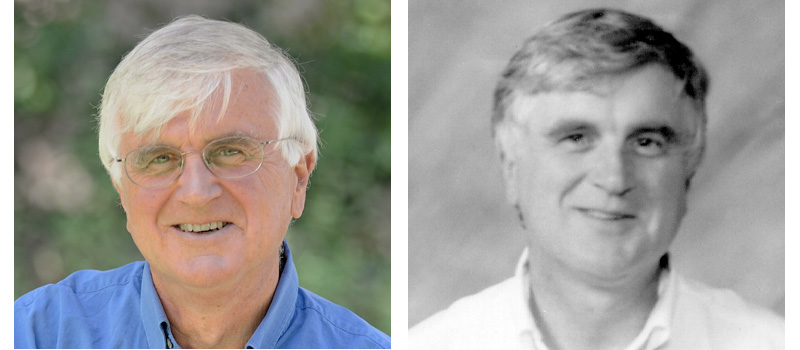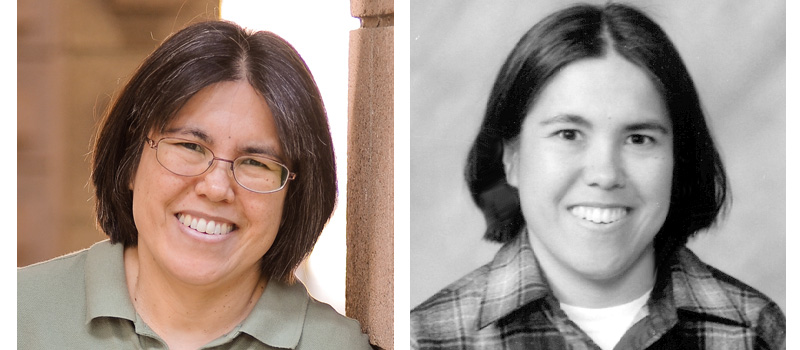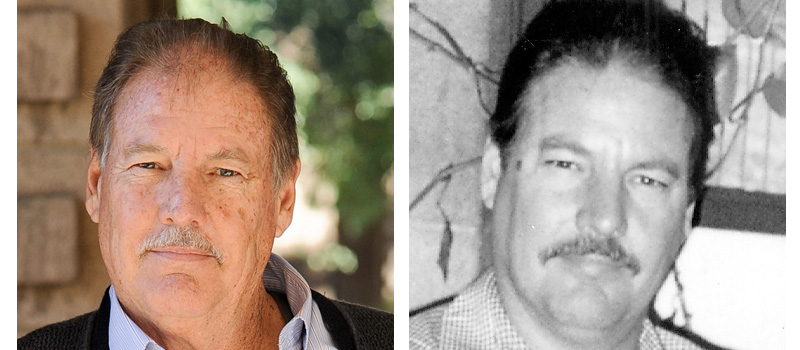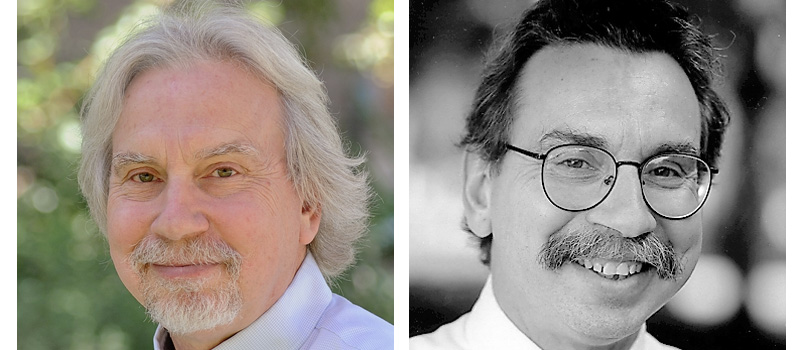Harvey Mudd Professors in Engineering, Economics Retire
May 11, 2020After decades of shaping the campus community and developing future scientists, engineers and entrepreneurs, four members of the Harvey Mudd College faculty have announced their retirement this spring: Anthony Bright, John Leland Atwood Professor of Engineering Science; Mary Cardenas, Anthony W. LaFetra Chair in Environmental Engineering; Gary Evans, Professor of Economics and Ruth and Harvey Berry Professor of Entrepreneurial Leadership; and Pat Little, J. Stanley and Mary Wig Johnson Professor of Engineering.
According to Lisa Sullivan, dean of the faculty, “Our faculty retirees are leaving a rich legacy and have been extraordinary contributors to the life of the College. They’ve enhanced our academic reputation, helped us maintain high standards and enabled us to continue innovating. Each has left an indelible imprint on the community and, thereby, on the College’s history.”
Anthony Bright, John Leland Atwood Professor of Engineering Science
 Anthony Bright joined the Department of Engineering at Harvey Mudd in 1986. He was department chair (1989–1990 and 2002–2007) and twice served (1992–1993 and 1993–1998) as director of the Engineering Clinic, what he calls “my greatest privilege” and the “jewel in the crown of the HMC experience.”
Anthony Bright joined the Department of Engineering at Harvey Mudd in 1986. He was department chair (1989–1990 and 2002–2007) and twice served (1992–1993 and 1993–1998) as director of the Engineering Clinic, what he calls “my greatest privilege” and the “jewel in the crown of the HMC experience.”
Bright held previous teaching positions at Teesside Polytechnic and the Open University in England and at the University of Delaware. While at the Open University, Bright developed distance-teaching material for undergraduate engineering education, including a series of 18 TV programs broadcast by the BBC. At Harvey Mudd, Bright has been involved in teaching and developing the interdisciplinary systems engineering stem of courses offered by the engineering department. His research interests include drops, bubbles and liquid jets: how they form, how they merge and how they change shape. In 2005, he founded Global Clinic, which prepares students for the future challenges of practicing engineering, science and mathematics in a global context. His many contributions include serving as an advisor to the Society of Women Engineers and advisor to the Etc. Players drama group.
Bright says, “What has always kept me excited and enthused about HMC is the passion for teaching and learning displayed by my early faculty mentors and colleagues in all departments.”
Some of his plans for retirement include continuing with his “lifelong learning project, writing, hiking, playing guitar, amusing the grandkids and enjoying Taco Doritos with scotch.”
Mary Cardenas, LaFetra Chair in Environmental Engineering
 Mary Cardenas has been a member of the Department of Engineering since 1995—the first female engineering professor at HMC—and has served as Engineering Clinic director and associate dean of faculty for academic affairs. A specialist in environmental engineering, aerospace engineering and fluid mechanics, her research focuses on the numerical modeling of various fluid/contaminant systems. She is an expert on the transport and fate of fine-grained sediments and contaminants in water bodies, including rivers and large lakes and has done research on sediment transport in Lake Michigan. She’s pursued this research at various labs, including the University of California, Sandia National Laboratories and the NOAA Great Lakes Environmental Research Laboratories.
Mary Cardenas has been a member of the Department of Engineering since 1995—the first female engineering professor at HMC—and has served as Engineering Clinic director and associate dean of faculty for academic affairs. A specialist in environmental engineering, aerospace engineering and fluid mechanics, her research focuses on the numerical modeling of various fluid/contaminant systems. She is an expert on the transport and fate of fine-grained sediments and contaminants in water bodies, including rivers and large lakes and has done research on sediment transport in Lake Michigan. She’s pursued this research at various labs, including the University of California, Sandia National Laboratories and the NOAA Great Lakes Environmental Research Laboratories.
As an educator, she focused on hands-on, project-based undergraduate engineering education and was co-designer of the sophomore-level, model-rocket-based experimental engineering course, and the first-year Studio Methods Engineering Design course. She has taught courses on fluid mechanics, environmental engineering and, most recently, one called Build Cool Things that she designed for first years with little experience using tools and machines so they could gain an understanding of the importance of and joy in practice, repetition and iteration in building. She has supervised undergraduate research projects on marine hydrokinetic turbine modeling; groundwater modeling for nuclear repositories; contaminant fate and transport in the Great Lakes; and model rocketry data acquisition.
Cardenas is the co-author of the Journal of Engineering Education paper, “Use of ‘Studio’ Methods in the Introductory Engineering Design Curriculum,” and she revised, updated and enlarged the book Modern Engineering for Design of Liquid-Propellant Rocket Engines (Huzel and Huang). Any engineer who works on rockets, and especially rocket engines, uses it as a design handbook. The courses she taught, and the experience she brought to the department, increased the percentage of HMC students who ended up at companies like Space-X and Blue Origin and helped increase the number of women propulsion engineers in the field.
Cardenas’ research and focus in engineering education is evident in her work with the American Society for Engineering Education (ASEE). She served in multiple officer roles for the Environmental Engineering Division and is currently a division director. Her ASEE research included first-year engineering design (studio); sophomore-level experimental engineering (rockets, which won a Best Paper Award from the Division of Experimentation and Laboratory-Oriented Studies); and environmental engineering pedagogy.
During her years of service to the HMC community, Cardenas was a mentor to HMC’s Society of Women Engineers club. For a SWE program, under Words of Wisdom, she wrote “Engineering is one of the most rewarding careers. We get to make people’s lives better! We get to see something we worked on do something! It’s not just understanding theory and science, but we get to create things that never existed before. We make an idea into reality.”
Gary Evans, Ruth and Harvey Berry Professorship in Entrepreneurial Leadership
 Gary Evans has long championed entrepreneurship at Harvey Mudd College, where, since 1981, he’s served as professor of economics in the Department of Humanities, Social Sciences, and the Arts. An expert in enterprise and entrepreneurship, financial institutions, and small business development, he’s taught courses in macroeconomics, entrepreneurship and finance. Evans has long championed online teaching and learning, and shares free online chapters in finance and macroeconomics as well as short instructional videos—what he calls targeted open online topics (TOOTs).
Gary Evans has long championed entrepreneurship at Harvey Mudd College, where, since 1981, he’s served as professor of economics in the Department of Humanities, Social Sciences, and the Arts. An expert in enterprise and entrepreneurship, financial institutions, and small business development, he’s taught courses in macroeconomics, entrepreneurship and finance. Evans has long championed online teaching and learning, and shares free online chapters in finance and macroeconomics as well as short instructional videos—what he calls targeted open online topics (TOOTs).
Employing a variety of strategies, Evans has strategically connected and inspired innovative students and alumni. In 1990, he founded the Harvey Mudd College Entrepreneurial Network, supported by a loyal cadre of alumni and friends. Its first meetings were held in Berkeley, Santa Clara, La Jolla and San Francisco and included Joe Costello ’74, electronic design automation pioneer (his companies include think3 and Electronic Speech Systems) and Dan Meacham ’95, analog subsystem designer (founder of innoCOMM and Staccato Communications). Evans encourages all entrepreneurial-minded students to attend Entrepreneurial Network meetings.
In 2017, Evans partnered with entrepreneur Josh Jones ’98, DreamHost co-founder, to start the Harvey Mudd incubator HMC INQ. Modeled after the successful and popular incubator Y Combinator, HMC INQ is open to anyone related to the College, and Evans says he will continue working with Jones and other alumni entrepreneurs.
Patrick Little, J. Stanley and Mary Wig Johnson Professor of Engineering Management
 Patrick Little came to Harvey Mudd after working in industry and government and co-founding a technical consulting and software company. He began his tenure on a four-year visiting appointment before being hired as the Johnson Professor of Engineering Management in the Department of Engineering in 1996. He taught a variety of courses including engineering design, systems engineering, civil engineering, project management and industrial engineering. He was director of the Global Clinic Program and the Engineering Clinic Program for a combined total of 11 years. Most recently, he served as chair of the faculty from 2016–2019.
Patrick Little came to Harvey Mudd after working in industry and government and co-founding a technical consulting and software company. He began his tenure on a four-year visiting appointment before being hired as the Johnson Professor of Engineering Management in the Department of Engineering in 1996. He taught a variety of courses including engineering design, systems engineering, civil engineering, project management and industrial engineering. He was director of the Global Clinic Program and the Engineering Clinic Program for a combined total of 11 years. Most recently, he served as chair of the faculty from 2016–2019.
With department colleagues Clive L. Dym and Elizabeth Orwin ’95, he co-authored the book Engineering Design: A Project-Based Introduction, now in its fourth edition. He is also the author of many journal and technical papers, covering topics including design education, railroad reliability and engineering ethics.
In recent years, Little has collaborated with Tom Maiorana from the University of California, Davis on a two-year National Science Foundation-sponsored project to understand choices that students make about graduate school and the ways that graduate programs present themselves to students. Their two-year project used human-centered design methods to understand and prototype ways to increase engagement in transformative research.
Little was the interim co-director of the Rick and Susan Sontag Center for Collaborative Creativity (The Hive) in 2015 when it was being formed. He says, “Helping to start the Hive was a real highlight of my career. The Hive has the potential to be truly transformative for students, faculty and even the colleges themselves.” Another high point of his career was coaching The Claremont Colleges Intercollegiate Roller Hockey team for many years, including winning the WCRHL Division 3 championship several times. This year, he was named an Honorary Alumnus by the HMC Alumni Association Board of Governors for being a longstanding friend of the College, its students and alumni, and for contributing significantly to its betterment.
Asked what he will miss at Harvey Mudd, Little speaks of students and, especially, the faculty. “My colleagues—what a great group of people,” says Little. “Whether stopping by to complain, exhort, query or even praise, I have so loved the close connection to my fellow teachers.”
In addition to some railroad consulting in retirement, Little says he plans to garden, travel and collect Japanese woodblock art. “But mostly, I want to spend time with my wife, Judy.”
